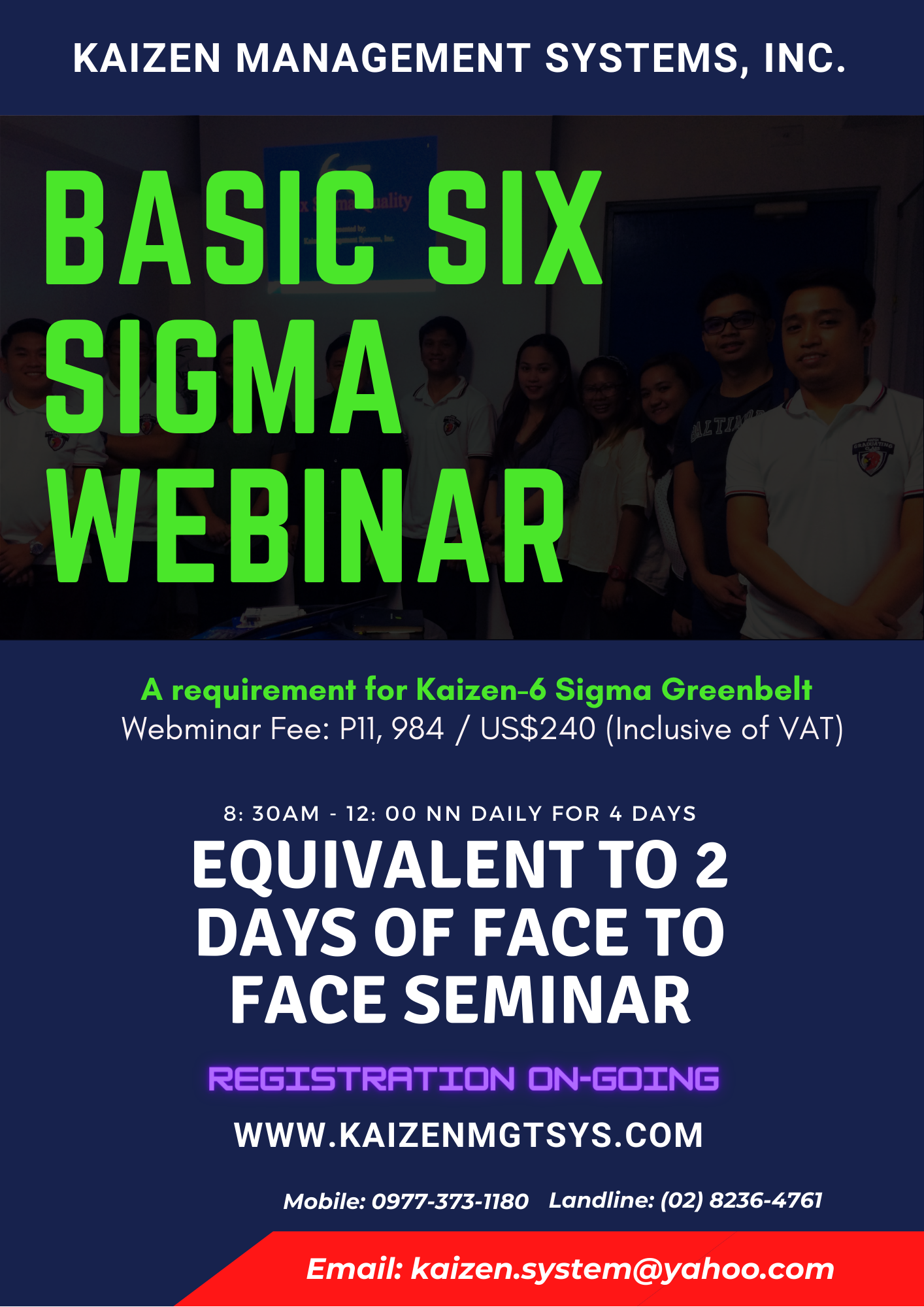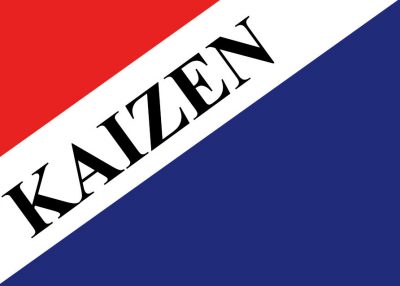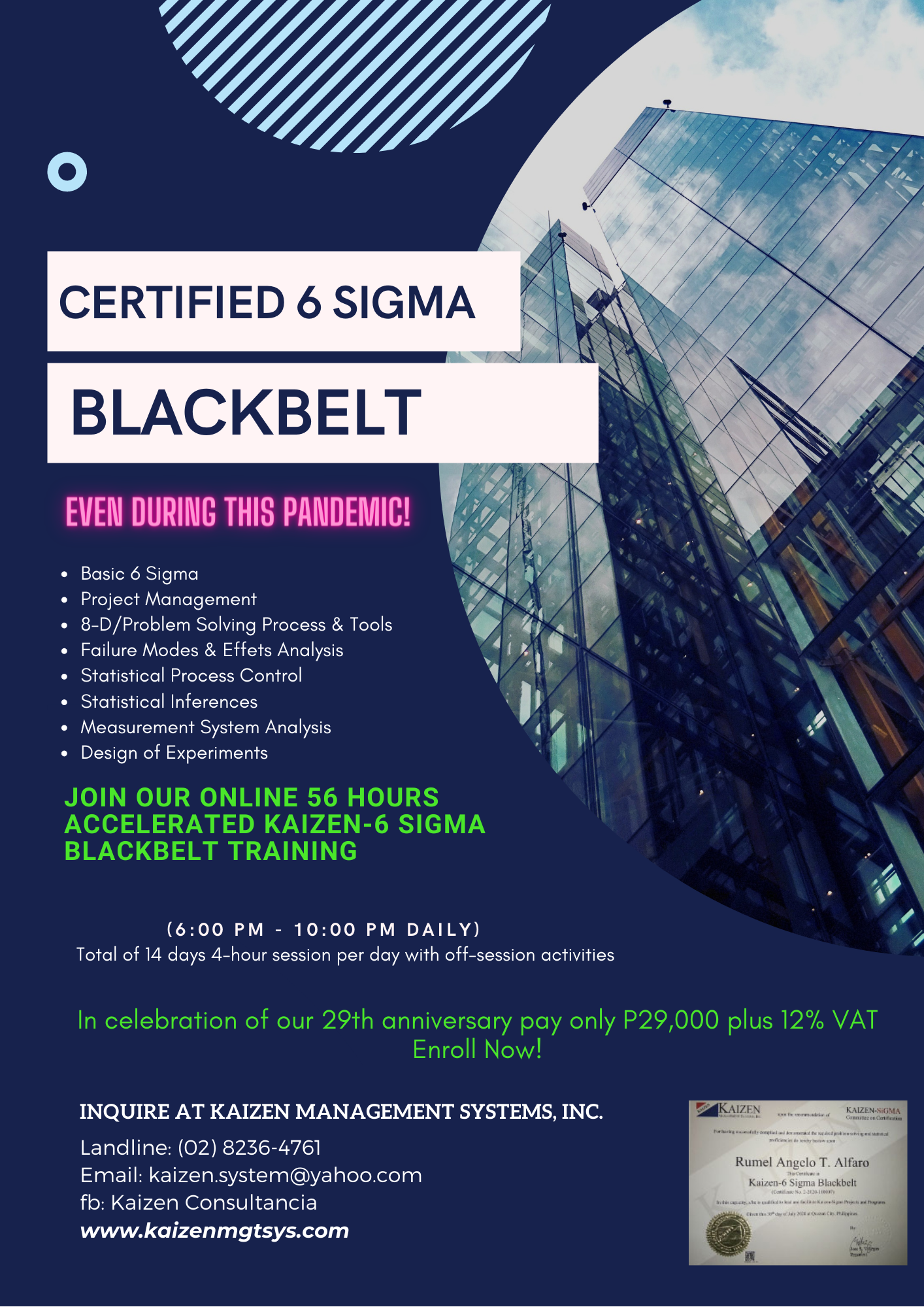Webinar Events
Basic Six Sigma (B6S) Webinar
Manufacturing and service industries generate a lot of data. Problems are solved using data and managerial decisions are based heavily on data. Thus, the ability to deal with data and make sense of it is foremost among the knowledge and skills that companies consider in selecting engineers, key personnel and managers. Six Sigma is the approach to use measurements and data to improve designs, processes and quality systems.
The Basic Six Sigma is an introductory course for kaizen and six sigma practitioners. This course has the potential to earn the participant 20 points under the Kaizen-6 Sigma Green Belt and Blackbelt System which are schemes to provide 6 sigma and statistical skills for kaizen problem-solving team members and leaders.
This training imparts the fundamental concepts and mental framework of Six Sigma. The necessity to employ statistical approaches is emphasized owing to the intention of six sigma system to attain the highest level of quality (99.99966% or 3.4 defects per million opportunities) and precision in process management linked to financial success of the company.
- Articulate the basic principles and concepts of Six Sigma;
- Describe the Six Sigma Road Map;
- Apply the DMAIC problem solving methodology; and
- Apply the process of 6σ Measures & Scoring System
Agenda:
- Introduction to Six Sigma
- Review of Three Sigma Control
- Principles & Concepts
- DMAIC & DMADV Cycles
- Six Sigma Road Map
- SIPOC Process Map
- Output & Service requirements
- Defect Opportunities
- The Six Sigma Score
- Leading & Organizing Six Sigma Efforts
- Kaizen & Six Sigma
- Workshops
Webinar Fee: P15,904 / 284USD (Inclusive of VAT) Per head – Includes certificate, digital material handouts, certificate of completion – to be sent via physical delivery. This will be subject to passing the quiz and submission of all workshop requirements to include off session work.
Note: Reservations are confirmed only when the seminar fees have been paid.
SeminarDates:
Aug 1-4’23 | Oct 24-27’23 | Jan 9-12’24
Time Frame: 8:30 am – 12: nn daily (Ph & Sg Time) 2 days equivalent (4 webinar sessions of up to 4 hours each)
Methodology: Lecture, discussion, workshop/exercises, Q & A, and quizzes.
Online Requirements:
• Laptop, Smartphone or Tablet with Internet capability
• Zoom Apps
• Clean Internet access
RESOURCE SPEAKER: Jose S. Villegas – President of Kaizen Management Systems, Inc. is one of the founders of the Maintenance Association of the Philippines and became its president in 1992-93. Holds a Master of Engineering and BS Chemical Engineering degrees from Mapua Institute of Technology (MIT). He is an AOTS scholar on Production Management in Japan and trained in Energy Management in Korea and Japan and Maintenance Management in India. Mr. Villegas served in several companies in various technical and managerial capacities. Curious with a predisposition to problem solving, Joe is a course designer and in charged of R&D of KMSI. He facilitates and consults on Value Engineering, Product Design and Development, Six Sigma, Lean/Just-in-Time System, Kaizen, Cycle Time Improvement, SPC and TPM. He is currently pursuing his doctoral degree in Environmental Engineering at MIT.
Value Analysis/Value Engineering (VAVE)
October 19-20, 2021 (8:30 AM-12:00 NN Daily for 2 sessions via Zoom)
Value Analysis/Value Engineering (VA/VE) has always been associated with product design. Little does everyone know that VA/VE can be a potent technique for process improvement as well as companies search for ways and means to reduce product cost in the process, VA/VE might just be the thing they are looking for.
The value of product or process is the lowest cost of providing a reliable performance of a function in particular and service in general. In real life, our products and processes are laden with lots of things and features that don’t add value but costs to the detriment of customers and end users. This seminar will clarify the issue of value and impart the techniques for identifying what is considered to be value and what is waste from the point of view of the customer. Moreover, it will teach the techniques of creating more value (in the process) for the customer and the systematic elimination of process wastes. The seminar will deal mostly on process VA/VE, although product VA/VE will be discussed just the same.
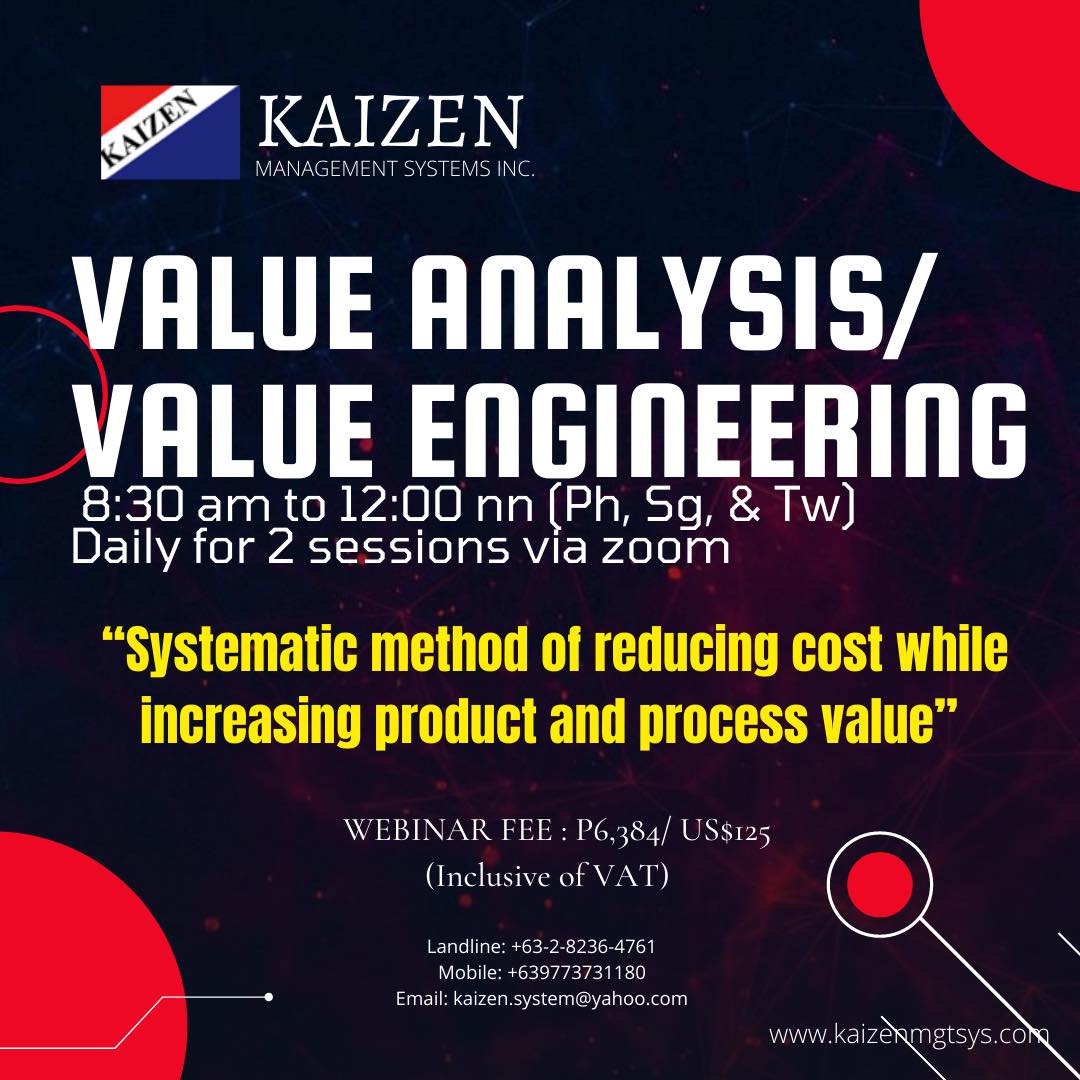
Objectives:At the end of the webinar, the participant would have acquired the following:
- Review of the fundamental concept of value in products and processes.
- Techniques to identify and analyze process wastes and non-value adding features in process and products.
- Techniques for eliminating non-value adding activities in processes.
Agenda:
- Value Analysis
- Function Analysis
- Product Design Improvement
- Intro to Function-Cost Matrix
- Function-Cost Matrix Workshop VA/VE in Process
- Using your brain
- 7Muda and 3Mu
- Shapes of VA/VE Solutions
- Muda Eliminations
- Kaizen & VA/VE
Who should attend: This webinar will be best for Product Designers, Production Engineers & Managers, Industrial Engineering, R & D, Process Audit; Improvement Teams, Maintenance & Engineering, and Training.
Please make check payable to
KAIZEN MANAGEMENT SYSTEMS, INC.
Account No: 001-473-0000-7473004042
Swift Code: MBTCPHMM
Cubao – Araneta Cyberpark, Quezon City
WEBINAR FEE: P6,384/ 125 USD (Inclusive of VAT) (digital pdf copy of the course manuals/workshop & certificate).
Time Frame: 8:30 am – 12: nn daily (Ph & Sg Time) 1 day equivalent (2 webinar sessions of up to 4 hours each)
Methodology: Lecture, discussion, workshop/exercises, Q & A, and quizzes.
Online Requirements:
- Laptop, Smartphone or Tablet with Internet capability
- Zoom Apps
- Clean Internet access
RESOURCE SPEAKER: Jose S. Villegas : President of Kaizen Management Systems, Inc. is one of the founders of the Maintenance Association of the Philippines and became its president in 1992-93. Holds a Master of Engineering and BS Chemical Engineering degrees from Mapua Institute of Technology (MIT). He is an AOTS scholar on Production Management in Japan and trained in Energy Management in Korea and Japan and Maintenance Management in India. Mr. Villegas served in several companies in various technical and managerial capacities. Curious with a predisposition to problem solving, Joe is a course designer and in charged of R&D of KMSI. He facilitates and consults on Value Engineering, Product Design and Development, Six Sigma, Lean/Just-in-Time System, Kaizen, Cycle Time Improvement, SPC and TPM. He is currently pursuing his doctoral degree in Environmental Engineering at MIT.
Problem Solving Process & Tools (PPT)
October 26-29, 2021 (8:30 AM-12:00 NN Daily)
This workshop imparts simple and easy yet effective tools and techniques in problem solving. Years of experience and observation of Kaizen consultants have proven that these tools and techniques can easily be learned by just about anyone, technical or non-technical.
The teaching methodology was designed for easy understanding and application. The participants will have the opportunity to apply the learning on actual problems they are facing back where they work. In the end they will be equipped with a logical sequence of problem-solving process from beginning to end known as the Kaizen Story.

Objectives:
At the end of this workshop, a successful participant will be able to: (1) discuss the concept of process waste; (2) define and isolate a problem; (3) draw a flowchart showing the problem-creating process; (4) use a cause and effect diagram to identify the most probable causes; (5) validate the most probable causes using checksheets, histograms, Pareto analysis, and scatter diagrams; and (6) formulate solutions and develop implementation and evaluation plans.
Agenda:
- Brainstorming
- Problem Definition and Dimensions
- The Concept of Process Waste
- Process Mapping
- Cause and Effect Diagram
- Checksheets and Data Gathering
- Histograms & Data Presentation
- The Pareto Principle and Diagram
- The Why-Why Diagram & Root Causes
- The Scatter Diagram
- Solution Generation & How-How Diagram
- Action Planning
- A3 Reports
Who should attend: Managers, engineers, supervisors, planners, trainors or staff especially those who are involved in identifying and solving high-priority work problems on production/operation, services, engineering, maintenance, marketing & sales and other functions. It will be ideal for companies who are into programs like Kaizen, Quality Circles, Six Sigma, and ISO-9000/TS16949 initiatives.
Language to be used: English
Please make check payable to
KAIZEN MANAGEMENT SYSTEMS, INC.
Account No: 001-473-0000-7473004042
Swift Code: MBTCPHMM
Cubao – Araneta Cyberpark, Quezon City
WEBINAR FEE: P11,984/ US$240 (Inclusive of VAT) (digital pdf copy of the course manuals/workshop & certificate).
Time Frame: 8:30 am – 12: nn daily (Ph & Sg Time) 2 days equivalent (4 webinar sessions of up to 4 hours each)
Methodology: Lecture, discussion, workshop/exercises, Q & A, and quizzes.
Online Requirements:
- Laptop, Smartphone or Tablet with Internet capability
- Zoom Apps
- Clean Internet access
RESOURCE SPEAKER: Jose S. Villegas : President of Kaizen Management Systems, Inc. is one of the founders of the Maintenance Association of the Philippines and became its president in 1992-93. Holds a Master of Engineering (IE) and BS Chemical Engineering degrees from Mapua UNiversity. He is an AOTS scholar on Production Management in Japan and trained in Energy Management in Korea and Japan and Maintenance Management in India. Mr. Villegas served in several companies in various technical and managerial capacities. Curious with a predisposition to problem solving, Joe is a course designer and in charged of R&D of KMSI. He facilitates and consults on Value Engineering, Product Design and Development, Six Sigma, Lean/Just-in-Time System, Kaizen, Cycle Time Improvement, SPC and TPM. He is currently pursuing his doctoral degree in Environmental Engineering at Mapua University.
Poka-Yoke (PYK)
Zero-Defect Operations by Mistake-Proofing the Process
November 16-17, 2021 (8:30 AM-12:00 NN Daily)
This workshop will examine the nature and types of human errors involving human-machine interfaces and provide the approaches to eliminate or avoid them through system improvement. The facilitator will employ actual cases from personal experience and everyday examples to add to the effectiveness of the learning session. The power of this workshop is that, participants have testified how ideas and solutions came up even while the seminar was still going one.
Poka-yoke is Japanese for mistake proofing. It was first proposed in 1961 by Shigeo Shingo and developed by him as an integral part of the Toyota Production System. It is indispensable to achieving zero defects and enabling Just-in-Time production operations and Six Sigma initiatives.
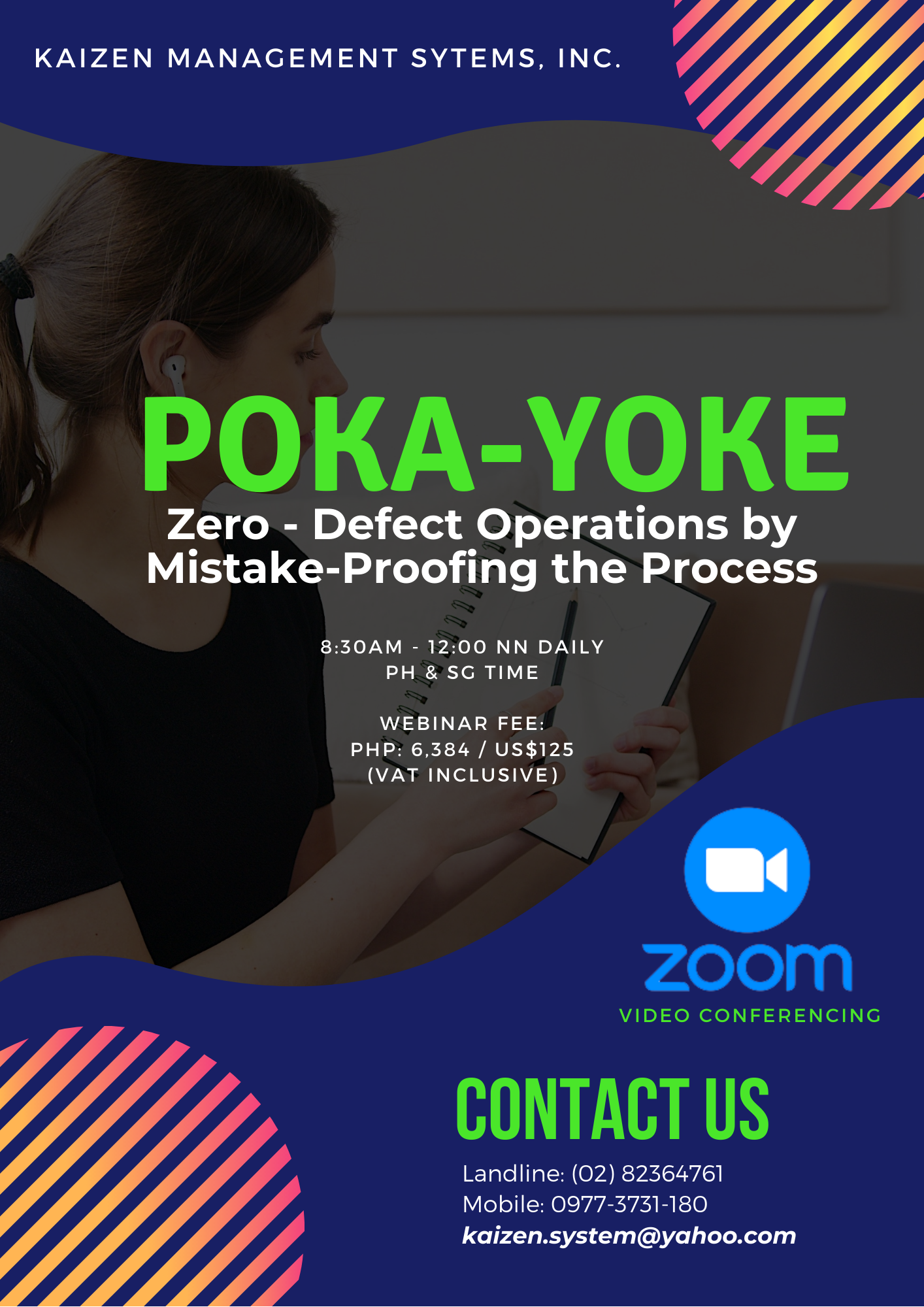
Objectives: the end of this webinar, the participants will be able to:
- Understand the basic principles and concepts behind poka-yoke
- Apply these principles and concepts to the development of a poka-yoke solution to an actual operating problem.
Agenda:
- Introduction
- The Changing Business Environment
- The Primary Purpose of A Business Enterprise
- Process and Results
- Two Approaches to Dealing with Errors
- Inspection Techniques
- Three Strategies for Zero-Defects
- Different Kinds of Human Errors
- Sources of Ideas for Poka-Yoke
- Product and Process Design
- Eight Principles
- Next Steps
- Examples of Poka-Yoke
- Basic Poka-Yoke Functions
- Detection Methods
- Poka-Yoke Devices and Systems
Who should attend: Recommended for plant managers, operations managers, business owners, process engineers, product design and development specialists, industrial engineers, and other personnel directly involved in the design, production, and distribution of products or in service design and operations.
Please make check payable to
KAIZEN MANAGEMENT SYSTEMS, INC.
Account No: 001-473-0000-7473004042
Swift Code: MBTCPHMM
Cubao – Araneta Cyberpark, Quezon City
WEBINAR FEE: P6,384/ 125 USD (Inclusive of VAT) (digital pdf copy of the course manuals/workshop & certificate).
Time Frame: : 8:30 am – 12: nn daily (Ph & Sg Time) 1 day equivalent (2 webinar sessions of up to 4 hours each)
Methodology: Lecture , discussion, workshop/exercises, Q & A, and quizzes.
Online Requirements:
- Laptop, Smartphone or Tablet with Internet capability
- Zoom Apps
- Clean Internet access
RESOURCE SPEAKER: Jose S. Villegas : President of Kaizen Management Systems, Inc. is one of the founders of the Maintenance Association of the Philippines and became its president in 1992-93. Holds a Master of Engineering and BS Chemical Engineering degrees from Mapua Institute of Technology (MIT). He is an AOTS scholar on Production Management in Japan and trained in Energy Management in Korea and Japan and Maintenance Management in India. Mr. Villegas served in several companies in various technical and managerial capacities. Curious with a predisposition to problem solving, Joe is a course designer and in charged of R&D of KMSI. He facilitates and consults on Value Engineering, Product Design and Development, Six Sigma, Lean/Just-in-Time System, Kaizen, Cycle Time Improvement, SPC and TPM. He is currently pursuing his doctoral degree in Environmental Engineering at MIT.
Statistical Process Control (SPC)
October 12-15, 2021 (8:30 AM-12:00 NN Daily for 4 sessions via Zoom)
Variations are common in nature and in industries. Customers abhor too much variability, in fact, the ability of a provider to predictably deliver uniform products and services is an indication of good quality. However, customers have accepted variations to be a fact of life so tolerances have been put in place. Processes can be controlled so that the resulting product or service doesn’t violate the customers’ tolerable measures. Statistical process control is an initiative to establish measure, monitor and control process performance (variability included) through the application of statistics. It attempts to detect abnormalities early enough in order to eliminate assignable causes that result in product defects.
Completion of course earns the participant 20 points credit for Kaizen-6 Sigma Green Belt and Black Belt Certification.
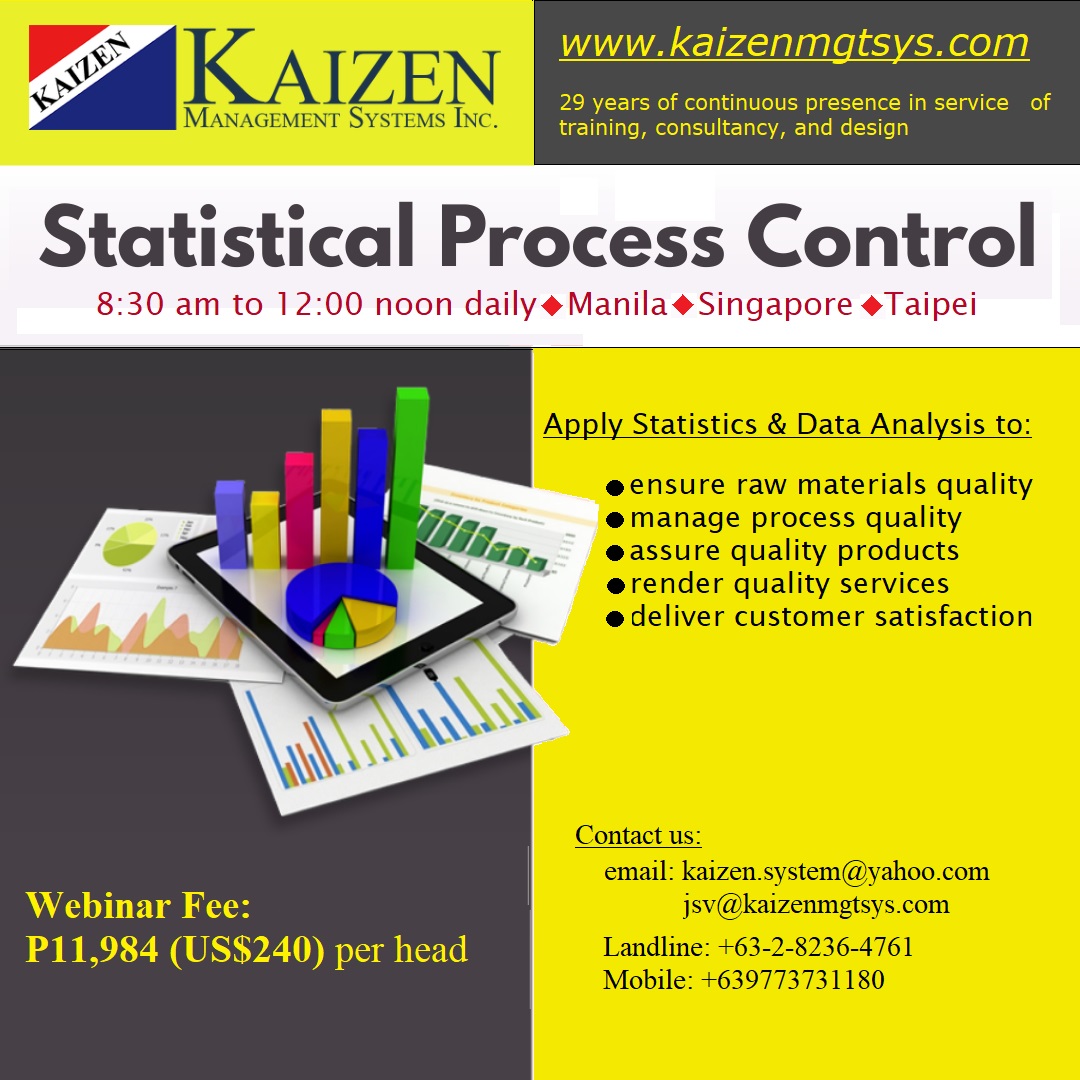
Objectives: By the end of the webinar, a successful participant will be able to:
- Explain the basic concepts & principles of statistics, probability, variation, measurements & control, such these can relate to their work situations;
- Elucidate on the basic principles behind statistical process control and process capability studies;
- Interpret quality reports and apply statistical tools and techniques in solving quality and design issues; and
- Develop statistical tools applicable to his/her company.
Agenda:
- Fundamentals of Quality Control
- Basic Statistics
- Concepts & Theories of Probability
- Theory of Variation
- The Concept of Measurement
- Acceptance Sampling
- Mil Std 105-E
- Sampling
- Histogram
- The Normal Curve
- Control Charts
- Process Capabilities & Tolerances
- SPC Management
- Introduction to Six Sigma Quality
- Problems & Cases
Who should attend: Prospective Kaizen-Sigma Green and Black Belts, Managers, Supervisors, Foremen, & Staff in Production; QA/QC; Industrial Engineering, R & D, Kaizen Teams, Maintenance & Engineering, & Training Departments
Language to be used: English
Please make check payable to
KAIZEN MANAGEMENT SYSTEMS, INC.
Account No: 001-473-0000-7473004042
Swift Code: MBTCPHMM
Cubao – Araneta Cyberpark, Quezon City
WEBINAR FEE: P11,984 / US$240 (Inclusive of VAT) (digital pdf copy of the course manuals/workshop & certificate).
Time Frame: 8:30 am – 12: nn daily (Ph & Sg Time) 4 webinar sessions of up to 4 hours each
Methodology: Lecture, discussion, workshop/exercises, Q & A, and quizzes.
Online Requirements:
- Laptop, Smartphone or Tablet with Internet capability
- Zoom Apps
- Clean Internet access
RESOURCE SPEAKER: Jose S. Villegas : President of Kaizen Management Systems, Inc. is one of the founders of the Maintenance Association of the Philippines and became its president in 1992-93. Holds a Master of Engineering (IE) and BS Chemical Engineering degrees from Mapua University. He is an AOTS scholar on Production Management in Japan and trained in Energy Management in Korea and Japan and Maintenance Management in India. Mr. Villegas served in several companies in various technical and managerial capacities. Curious with a predisposition to problem solving, Joe is a course designer and in charged of R&D of KMSI. He facilitates and consults on Value Engineering, Product Design and Development, Six Sigma, Lean/Just-in-Time System, Kaizen, Cycle Time Improvement, SPC and TPM. He is currently pursuing his doctoral degree in Environmental Engineering at Mapua University.
Total Productive Maintenance (TPM)
(July 18-21, 2023 | 8:30 AM-12:00 NN Daily for 4 sessions via Zoom)
Every company is in business to delight its customers through timely delivery of quality products and services at minimal prices. Quality, delivery and cost suffer when machines breakdown suddenly without warning or when they do not run properly. This workshop is a two-day seminar that teaches the system of Total Productive Maintenance (TPM) from the vantage of the Kaizen or continuous process improvement strategy as well as the Section 8.5.1.2 of IATF 16949:2016. It provides an introductory treatment for companies who would embark on TPM program and for individuals who are about to become a part of an existing TPM system. The workshop will impart the concepts and methods of conducting an in-plant TPM style shop floor improvement. TPM is a Japanese approach of reducing product cost by improving the overall equipment effectiveness through elimination of muda or non-value adding activities in operations and in the preventive maintenance of machines and equipment. The approach employs the concept of Total System Focus involving everyone particularly the production and maintenance people in the process of muda elimination.
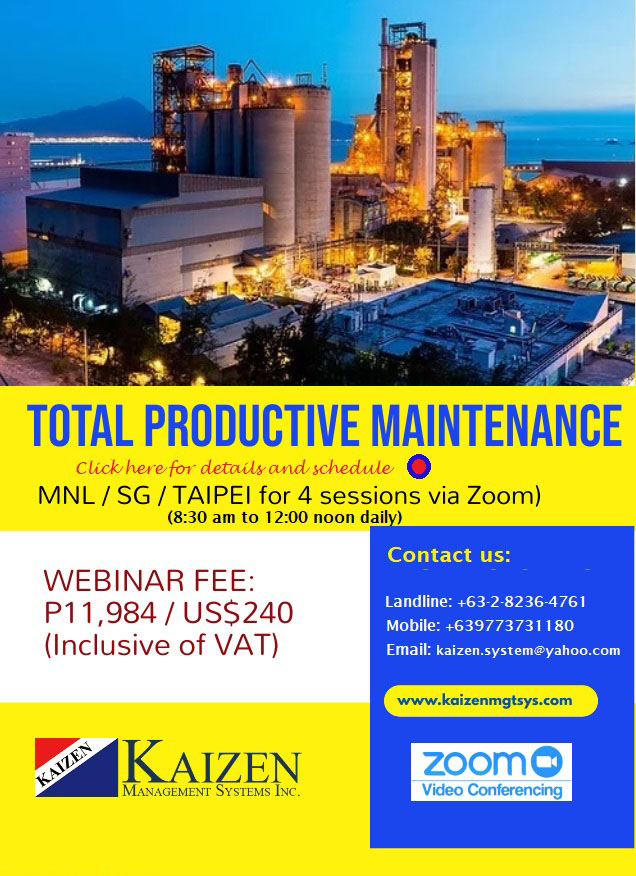
Objectives: By the end of the webinar, the following would have been accomplished:
- Mental conversion to the Kaizen philosophy that inspires people to change;
- Learned the basic concepts, tools and techniques of TPM, and the system for continuous improvement of the Overall Equipment Effectiveness (OEE); and
- Learned the method for improving and establishing standards for autonomous, reliability, breakdown and planned maintenance.
Agenda:
- Kaizen Philosophy
- Principles of Continuous Improvement
- Concepts of Continuous Improvement
- TPM Results & OEE
- TPM Metrics
- TPM Process & 8 Pillars
- 5-S Activities
- Abnormality Management
- Changeover & Set-Up Reduction
- Reliability Maintenance
- Migration of Breakdown to Planned Maintenance
- Steps to Autonomous Maintenance
- Continuous Improvement Culture
Who should attend:Managers, Engineers and Staff In-charge of Production, Maintenance, PM and TPM Programs
Please make check payable to
KAIZEN MANAGEMENT SYSTEMS, INC.
Account No: 001-473-0000-7473004042
Swift Code: MBTCPHMM
Cubao – Araneta Cyberpark, Quezon City
WEBINAR FEE: P11,984 / US$240 (VAT Inclusive)
(To be provided will be PDF copy of the course manuals/workshop & certificate of completion)
Time Frame: : 8:30 am – 12: nn daily (Ph & Sg Time) 4 webinar sessions of up to 4 hours each
Methodology: Lecture, discussion, workshop/exercises, Q & A, and quizzes.
Online Requirements:
- Laptop, Smartphone or Tablet with Internet capability
- Zoom Apps
- Clean Internet access
RESOURCE SPEAKER: Jose S. Villegas : President of Kaizen Management Systems, Inc. is one of the founders of the Maintenance Association of the Philippines and became its president in 1992-93. Holds a Master of Engineering (IE) and BS Chemical Engineering degrees from Mapua University. He is an AOTS scholar on Production Management in Japan and trained in Energy Management in Korea and Japan and Maintenance Management in India. Mr. Villegas served in several companies in various technical and managerial capacities. Curious with a predisposition to problem solving, Joe is a course designer and in charged of R&D of KMSI. He facilitates and consults on Value Engineering, Product Design and Development, Six Sigma, Lean/Just-in-Time System, Kaizen, Cycle Time Improvement, SPC and TPM. A Kaizen-Sigma Master Blackbelt holder, he is currently pursuing his doctoral degree in Environmental Engineering at MIT.
